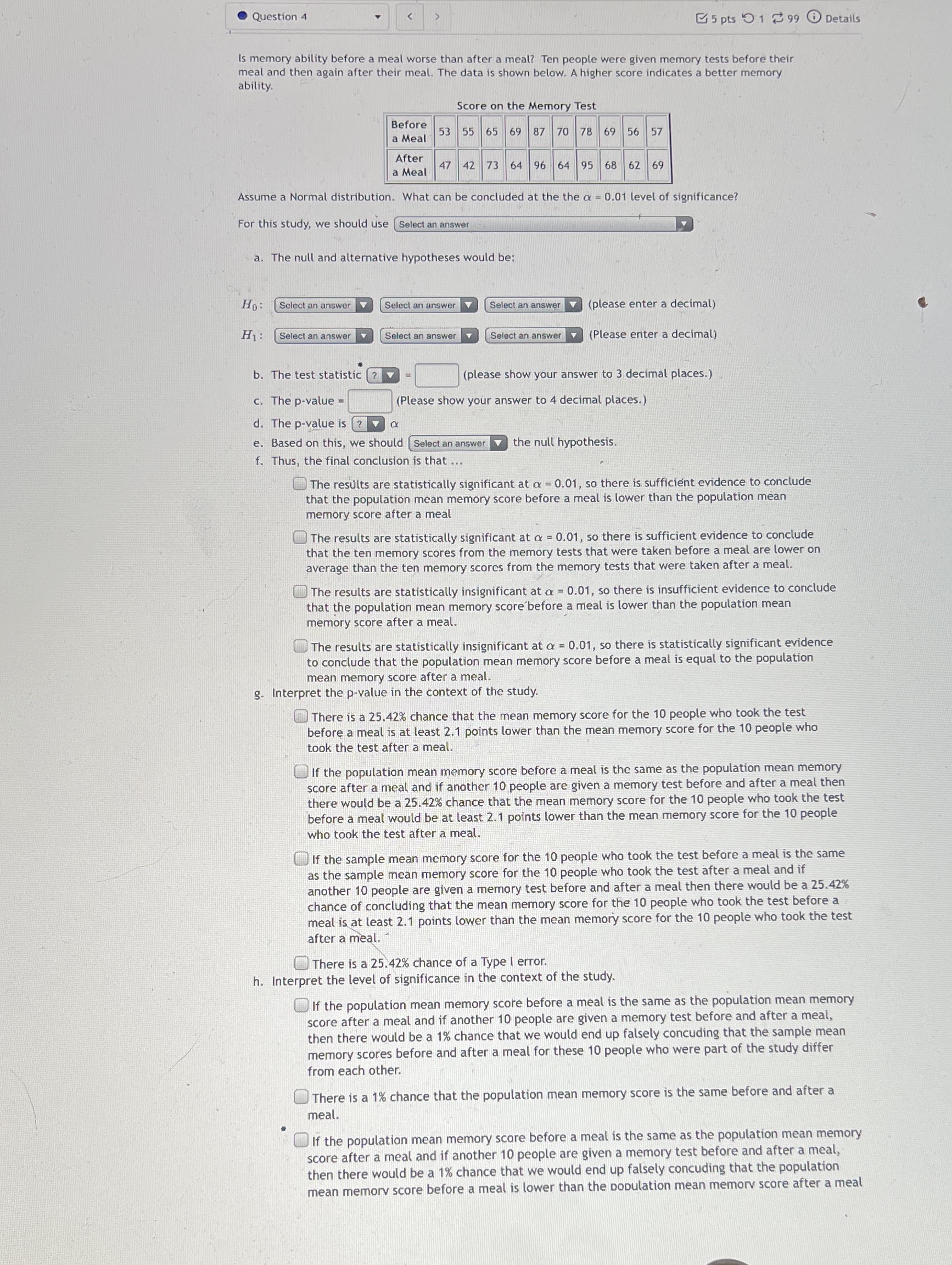Question 4 5 pts 9 1 99 0 Details Is memory ability before a meal worse than after a meal? Ten people were given memory tests before their meal and then again after their meal. The data is shown below. A higher score indicates a better memory ability. Score on the Memory Test Before a Meal 53 55 65 69 87 70 78 69 56 57 After a Meal 47 42 73 64 96 64 95 68 62 69 Assume a Normal distribution. What can be concluded at the the a = 0.01 level of significance? For this study, we should use Select an answer a. The null and alternative hypotheses would be: Ho: Select an answer V Select an answer V Select an answer V (please enter a decimal) H1: Select an answer Select an answer Select an answer (Please enter a decimal) b. The test statistic ? = (please show your answer to 3 decimal places.) C. The p-value = (Please show your answer to 4 decimal places.) d. The p-value is ? vo e. Based on this, we should (Select an answer v the null hypothesis. f. Thus, the final conclusion is that ... The results are statistically significant at or = 0.01, so there is sufficient evidence to conclude that the population mean memory score before a meal is lower than the population mean memory score after a meal The results are statistically significant at a = 0.01, so there is sufficient evidence to conclude that the ten memory scores from the memory tests that were taken before a meal are lower on average than the ten memory scores from the memory tests that were taken after a meal. The results are statistically insignificant at o = 0.01, so there is insufficient evidence to conclude that the population mean memory score before a meal is lower than the population mean memory score after a meal. The results are statistically insignificant at o = 0.01, so there is statistically significant evidence to conclude that the population mean memory score before a meal is equal to the population mean memory score after a meal. g. Interpret the p-value in the context of the study. There is a 25.42% chance that the mean memory score for the 10 people who took the test before a meal is at least 2.1 points lower than the mean memory score for the 10 people who took the test after a meal. If the population mean memory score before a meal is the same as the population mean memory score after a meal and if another 10 people are given a memory test before and after a meal then there would be a 25.42% chance that the mean memory score for the 10 people who took the test before a meal would be at least 2.1 points lower than the mean memory score for the 10 people who took the test after a meal. If the sample mean memory score for the 10 people who took the test before a meal is the same as the sample mean memory score for the 10 people who took the test after a meal and if another 10 people are given a memory test before and after a meal then there would be a 25.42% chance of concluding that the mean memory score for the 10 people who took the test before a meal is at least 2.1 points lower than the mean memory score for the 10 people who took the test after a meal. There is a 25.42% chance of a Type | error. h. Interpret the level of significance in the context of the study. If the population mean memory score before a meal is the same as the population mean memory score after a meal and if another 10 people are given a memory test before and after a meal, then there would be a 1% chance that we would end up falsely concuding that the sample mean memory scores before and after a meal for these 10 people who were part of the study differ from each other. There is a 1% chance that the population mean memory score is the same before and after a meal. if the population mean memory score before a meal is the same as the population mean memory score after a meal and if another 10 people are given a memory test before and after a meal then there would be a 1% chance that we would end up falsely concuding that the population mean memory score before a meal is lower than the population mean memory score after a meal







